2014版高考英语模拟试题精编9
- 格式:doc
- 大小:858.50 KB
- 文档页数:11
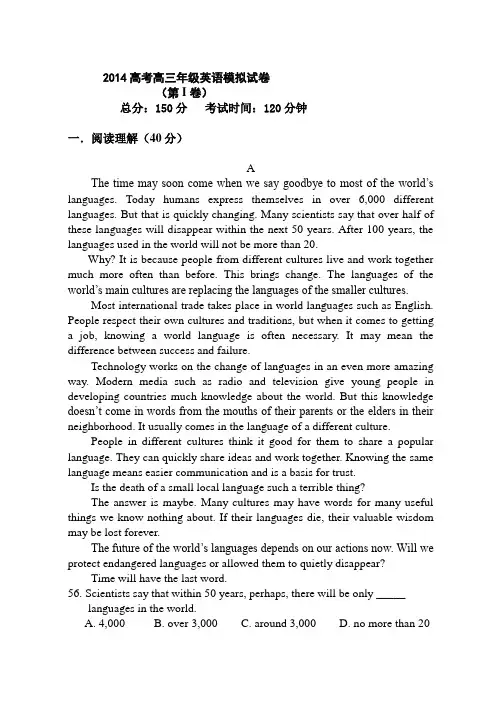
2014高考高三年级英语模拟试卷(第I卷)总分:150分考试时间:120分钟一.阅读理解(40分)AThe time may soon come when we say goodbye to most of the world’s languages. Today humans express themselves in over 6,000 different languages. But that is quickly changing. Many scientists say that over half of these languages will disappear within the next 50 years. After 100 years, the languages used in the world will not be more than 20.Why? It is because people from different cultures live and work together much more often than before. This brings change. The languages of the world’s main cultures are replacing the languages of the smaller cultures.Most international trade takes place in world languages such as English. People respect their own cultures and traditions, but when it comes to getting a job, knowing a world language is often necessary. It may mean the difference between success and failure.Technology works on the change of languages in an even more amazing way. Modern media such as radio and television give young people in developing countries much knowledge about the world. But this knowledge doesn’t come in words from the mouths of their parents or the elders in their neighborhood. It usually comes in the language of a different culture.People in different cultures think it good for them to share a popular language. They can quickly share ideas and work together. Knowing the same language means easier communication and is a basis for trust.Is the death of a small local language such a terrible thing?The answer is maybe. Many cultures may have words for many useful things we know nothing about. If their languages die, their valuable wisdom may be lost forever.The future of the world’s languages depends on our actions now. Will we protect endangered languages or allowed them to quietly disappear?Time will have the last word.56. Scientists say that within 50 years, perhaps, there will be only _____languages in the world.A. 4,000B. over 3,000C. around 3,000D. no more than 2057. In “The languages of the world’s main cultures are replacing thelanguages of the smaller cultures,” the verb “replace” means “_____”.A. to put something back into a correct placeB. to use a second thing in place of the first thingC. to find good place for somethingD. to decide how important something is58. The passage says that if all the people in the world knew a major worldlanguage, _____.A. radio and television would all use the languageB. it would be easier for them to share their ideasC. lessons at schools would be taught in the languageD. people would respect their own culture more59. Also, the passage says that if nobody spoke the languages of smallercultures, _____.A. Many of the words for things we do not know would be lost.B. knowledge would come from the mouths of the eldersC. people would have difficult in working togetherD. there would be no smaller cultures.60. By saying “Time will have the last word,” the writer means “ _____”.A. let us wait and seeB. we have time to do somethingC. it is too late to do anythingD. it is only a problem of timeBPeople who are cheerful and relaxed are less likely to suffer from colds. It’s possible that being full of vim and vigor helps the body fight illnesses, say the researchers from Carnegie Mellon University (CMU) in Pittsburgh.“We need to take more seriously the possibility that a positive emotional style is a major player in disease risk,” says psychologist Sheldon Cohen, the study’s lead researcher.In a previous study, Cohen and his colleagues found that people who tended to be cheerful and lively were least likely to develop sniffles, coughs, and other cold symptoms.Those findings were interesting, but they didn’t prove that a person’s attitude affects whether he or she gets sick. Instead, it was still probable that a person’s underlying personality is what matters.Evidence suggests, for instance, that certain people are naturally more likely to be outgoing and optimistic, with high self-respect and a sense of2control over life. This would mean that who we are, not how we feel, finally decides our chances of catching colds.To figure out which mattered more (personality or emotions). The CMU team interviewed 193 healthy adults. The researchers talked to each person over the phone every evening for 2 weeks. They told the researchers about the positive and negative feelings that they had experienced that day.The results showed that everyone in the study was equally likely to get infected. Their symptoms, however, differed depending on the types of emotions that they had reported over the previous 2 weeks.Among those who reported good moods and had been infected with the flu virus, for example, 28 percent developed coughs and stuffy (堵塞) noses. On the other hand, those symptoms struck 41 percent of people who had been less positive. Scientists argue about whether negative emotions or positive emotions have a stronger effect on how healthy we are, For now, it can not hurt to look on the bright side more often than not.61. What is the text mainly about?A. How to get rid of colds.B. Attitude determines life.C. Smiles turn away colds.D. Different opinions about colds.62.The phrase”full of vim and vigor” underlined in Paragraph 1 probablymeans___________.A.ignorantB. Well-informedC. energeticD. in low spirits63.According to the research, persons who are likely to catch colds should bethose __________?A. Who have negative attitude towards their life.B. Who are very emotional and optimistic.C. Who are open-minded and outgoing.D. Who have trouble with their noses64.The last paragraph implies that __________.A.positive and negative emotions have good aspects.B.people who have been less positive tend to catch colds.C.Keeping an optimistic state of mind is good for health.D.positive emotions have a stronger effect on health.C高三英语第3页Comic Strips(连环漫画)For hundreds of years, artists have used cartoons to criticize bad rulers or landowners. As early as the 19th century, people produced and read books of drawing. In many ways, they were similar to modern comics. They contained stories of naughty children and playful animals. The owl(猫头鹰)and the elephant were usually wise animals, ready to give advice. The lion and the tiger were brave. The fox and the wolf were cunning(狡猾的)greedy(贪婪的)and dangerous.A century ago, an American newspaper published the first full-colour comic strip. It was so popular that sales of the newspaper, Morning Journal, increased quickly. Since then, newspapers throughout the world have included comic strips.In modern times, comics are popular in China, Japan, the USA and almost everywhere. Not even video games or CD-ROMs have reduced their popularity. Names such as Snoopy, Woodstock and Garfield are well known in dozens of countries. The Peanuts comic strip appears in over 2,000 newspapers and in more than 25 languages. People believe that its creator, Charles M. Schultz, earned US$60 million a year.Perhaps one day, you may like to create your own comic strip and become a millionaire. First, you must think of a good plot. It should be funny, exciting or interesting in some way. It should have plenty of action. Moreover, the language must be realistic and simple. The words should suit the characters in your story. One type of person might say, “Please be quiet and listen to what we have to say.” But another type of character might simply say, “Shut up and listen!”Furthermore, the characters in your story must be clear to readers. They should be obviously good or bad ---- and not a mixture of both. A leader must be stronger or cleverer than his or her followers. In many comic strips ---- especially those showing crime of adventure ---- there should also be a hero or heroine. This will attract the reader to keep on reading the story.65. The underlined word “plot” is similar in meaning to _____.A. placeB. stripC. storyD. character66. Which of the following is NOT the name of a cartoon Character?A. Snoopy.B. Peanuts.C. Woodstock.D. Garfield.67. In the 19th century, the wolf in the cartoons was NOT _____.A. cunningB. dangerousC. greedyD. brave4DMeetings don’t just eat up time in the workplace ; they actually make groups of people stupider, says new research.Working in a group makes people perform worse on intelligence tests, as some group members are so anxious about doing well that they “divert”their brain towards maintaining their social status in the group.You may joke about how committee meetings make you feel brain dead, but our findings suggest that they make you act brain dead as well, said Read Montague the study leader at Virginia Tech.Groups of volunteers showed measurable drops in IQ when asked to perform intelligence tests socially, with the results broadcast to the group.Some people performed well in the “social”tests, but others were affected badly--- and overall,performance dropped.Women appear to feel this pressure more than men---only three out of 13 female volunteers performed well in a social environment, with 10 out of 13 finding that their performance dropped.The researchers used a magnetic resonance imaging (MRI) scanner to monitor how people’s brains responded--- and found that bad performers tended to show activity in parts of their brain that dealt with emotions and anxiety.“We started with individuals who were matched for their IQ,”said Montague. “Yet when we placed them in small groups, ranked their performance on tasks against their peers, and broadcast the rankings, we saw dramatic drops in the ability of some study subjects to solve problems.”“Our study highlights the unexpected and dramatic consequences even subtle social signals in group settings may have on the individual,” said lead author Keneth Kishida.“We don’t know how much these effects are present in real-world settings. By placing an emphasis on competition, for example, are we missinga large segment of the talent pool?”68. Which of the following statements is Not true according to thepassage?A. Meetings make groups of people stupider.B. Meetings make you act brain dead.C. Meetings make people perform worse on intelligence tests.高三英语第5页D. Meetings don’t affect men’s performance in intelligence tests.69. This passage can be classified as __________.A. An advertisementB.a book reviewC. A feature storyD.a science report70.What would be the best title of the text?A. Brainstorming? More Like Brain DrainB. Brainstorming Affects People”s IQ TestC. Brainstorming Makes People Act Brain DeadD.Brainstorming Affects Women’s PerformanceE根据短文内容,从短文后的选项中选出能填入空白处的最佳选项。
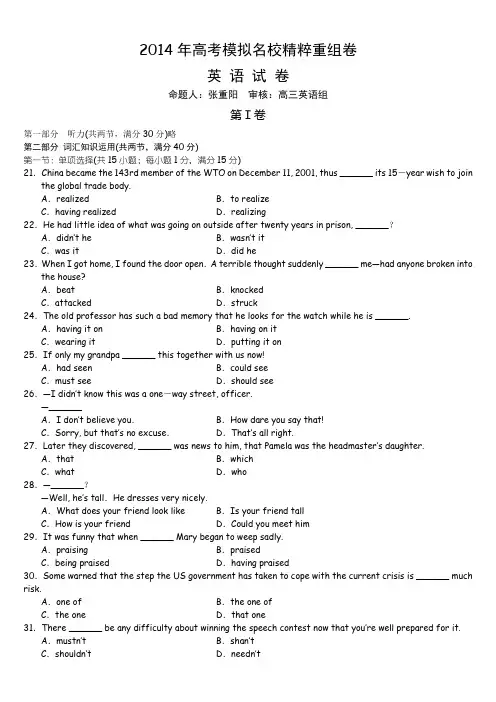
2014年高考模拟名校精粹重组卷英语试卷命题人:张重阳审核:高三英语组第I卷第一部分听力(共两节,满分30分)略第二部分词汇知识运用(共两节,满分40分)第一节:单项选择(共15小题;每小题1分,满分15分)21.China became the 143rd member of the WTO on December 11, 2001, thus ______ its 15-year wish to join the global trade body.A.realized B.to realizeC.having realized D.realizing22.He had little idea of what was going on outside after twenty years in prison, ______?A.didn’t he B.wasn’t itC.was it D.did he23.When I got home, I found the door open.A terrible thought suddenly ______ me—had anyone broken into the house?A.beat B.knockedC.attacked D.struck24.The old professor has such a bad memory that he looks for the watch while he is ______.A.having it on B.having on itC.wearing it D.putting it on25.If only my grandpa ______ this together with us now!A.had seen B.could seeC.must see D.should see26.—I didn’t know this was a one-way street, officer.—______A.I don’t believe you.B.How dare you say that!C.Sorry, but that’s no ex cuse.D.That’s all right.27.Later they discovered, ______ was news to him, that Pamela was the headmaster’s daughter.A.that B.whichC.what D.who28.—______?—Well, he’s tall.He dresses very nicely.A.What does your friend look like B.Is your friend tallC.How is your friend D.Could you meet him29.It was funny that when ______ Mary began to weep sadly.A.praising B.praisedC.being praised D.having praised30.Some warned that the step the US government has taken to cope with the current crisis is ______ much risk.A.one of B.the one ofC.the one D.that one31.There ______ be any difficulty about winning the speech contest now that you’re well prepared for it.A.mustn’t B.shan’tC.shouldn’t D.needn’t32.Liu Xiang’s breaking the world record was an exciting moment, ______ all of us will never forget.A.that B.one C.it D.what33.______ left before the deadline, it doesn’t seem likely that John will finish the job.A.Though such a short time B.Because such a short timeC.With such a short time D.As such a short time34.Jane was so ______ for the news of her lost child that she was almost driven ______.A.proper; madly B.thirsty; madC.sad; madly D.curious; mad35.—Don’t you f eel surprised to see Bruce at the meeting?—Yes, I really didn’t think ______ here.A.he has been B.he had beenC.he would be D.he would have第二节:完形填空(共20小题;每小题1.5分,满分30分)阅读下面短文,从短文后所给各题的四个选项(A、B、C、D)中,选出能填入相应空白处的最佳选项,并在答题卡上将该项涂黑。
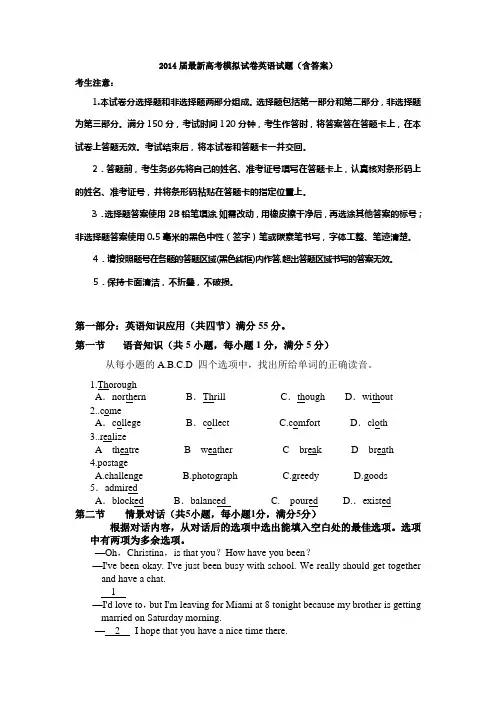
2014届最新高考模拟试卷英语试题(含答案)考生注意:1.本试卷分选择题和非选择题两部分组成。
选择题包括第一部分和第二部分,非选择题为第三部分。
满分150分,考试时间120分钟,考生作答时,将答案答在答题卡上,在本试卷上答题无效。
考试结束后,将本试卷和答题卡一并交回。
2.答题前,考生务必先将自己的姓名、准考证号填写在答题卡上,认真核对条形码上的姓名、准考证号,并将条形码粘贴在答题卡的指定位置上。
3.选择题答案使用2B铅笔填涂,如需改动,用橡皮擦干净后,再选涂其他答案的标号;非选择题答案使用0.5毫米的黑色中性(签字)笔或碳素笔书写,字体工整、笔迹清楚。
4.请按照题号在各题的答题区域(黑色线框)内作答,超出答题区域书写的答案无效。
5.保持卡面清洁,不折叠,不破损。
第一部分:英语知识应用(共四节)满分55分。
第一节语音知识(共5小题,每小题1分,满分5分)从每小题的A.B.C.D 四个选项中,找出所给单词的正确读音。
—I'm taking tennis lesson. My roommate is on a tennis team and she's gotten me interested in the sports.5—A little,but I haven't played for years. When I come back from my trip,I'll join you in taking lessons.—OK. Just give me a call when you get back.—I'll.A. I didn't know you could play tennis.B. but I'm on my way to the tennis courts.C. Give him my best wishes!D. Do you know how to play?E. Have a good time!F. How about joining me for dinner tonight?G. Do you play well?第三节语法和词汇知识(共15小题,每小题1分,满分15分)从每小题的A.B.C.D 四个选项中,选出可以填入空白处的最佳选项。
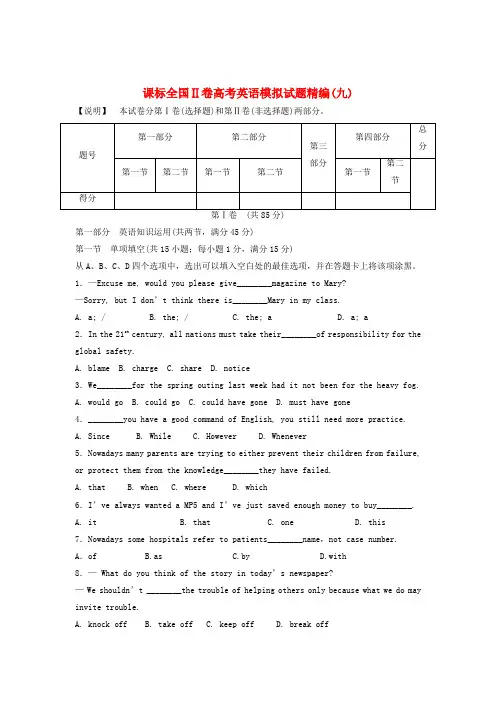
课标全国Ⅱ卷高考英语模拟试题精编(九)【说明】本试卷分第Ⅰ卷(选择题)和第Ⅱ卷(非选择题)两部分。
第一部分英语知识运用(共两节,满分45分)第一节单项填空(共15小题;每小题1分,满分15分)从A、B、C、D四个选项中,选出可以填入空白处的最佳选项,并在答题卡上将该项涂黑。
1.—Excuse me, would you please give________magazine to Mary?—Sorry, but I don’t think there is________Mary in my class.A. a; /B. the; /C. the; aD. a; a2.In the 21st century, all nations must take their________of responsibility for the global safety.A. blameB. chargeC. shareD. notice3.We________for the spring outing last week had it not been for the heavy fog.A. would goB. could goC. could have goneD. must have gone4.________you have a good command of English, you still need more practice. A. Since B. While C. However D. Whenever5.Nowadays many parents are trying to either prevent their children from failure, or protect them from the knowledge________they have failed.A. thatB. whenC. whereD. which6.I’ve always wanted a MP5 and I’ve just saved enough money to buy________.A. itB. thatC. oneD. this 7.Nowadays some hospitals refer to patients________name,not case number. A.of B.as C.by D.with8.—What do you think of the story in today’s newspaper?—We shouldn’t ________the trouble of helping others only because what we do may invite trouble.A. knock offB. take offC. keep offD. break off9.All of us have read thrilling stories in which the hero had only a limited time to live. Such stories set us________,________what we should do under similar circumstances.A. thinking; wonderingB. to think; wonderingC. thinking; to wonderD. to think; to wonder10.It________rain in the desert sometimes, but you can't depend on it.A. willB. shallC. mustD. can11.Jane, I miss you very much. I________meeting you ever since we parted.A. have been looking forward toB. was looking forward toC. had been looking forward toD. looked forward to12.You’d better set aside some time every day for sports________busy you are in Senior 3.A.no matter B.whatever C.even though D.however 13.The question________you should take this medicine should be decided by your family doctor.A. whyB. whetherC. ifD. that 14.The Tower Bridge,________in the 1890s, still plays an important role in London traffic.A. which constructedB. constructingC. constructedD. that was constructed15.________with his slippers on when he heard the terrible noise.A.Out did the boy rush B.Out rushed the boy C.Out the boy rushed D.Rushed the boy out第二节完形填空(共20小题;每小题1.5分,满分30分)阅读下面短文,从短文后各题所给的四个选项(A、B、C、D)中,选出可以填入空白处的最佳选项,并在答题卡上将该项涂黑。
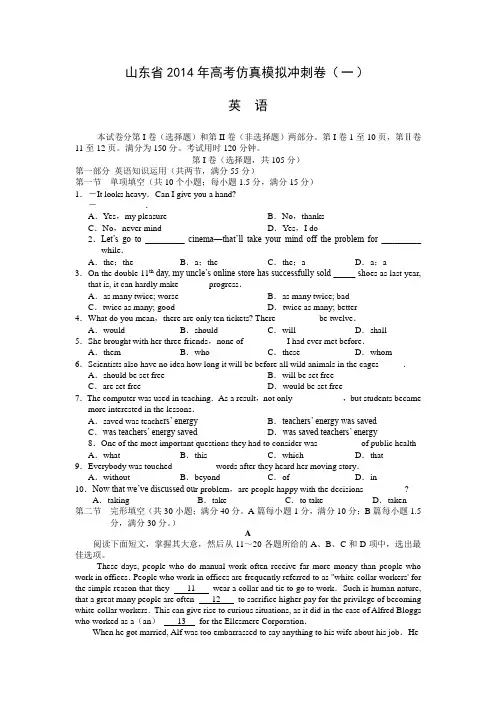
山东省2014年高考仿真模拟冲刺卷(一)英语本试卷分第I卷(选择题)和第II卷(非选择题)两部分。
第I卷1至10页,第Ⅱ卷11至12页。
满分为150分。
考试用时120分钟。
第I卷(选择题,共105分)第一部分英语知识运用(共两节,满分55分)第一节单项填空(共10个小题;每小题1.5分,满分15分)1.-It looks heavy.Can I give you a hand?-___________.A.Yes,my pleasure B.No,thanksC.No,never mind D.Yes,I do2.Let’s go to _________ cinema—that’ll take your mind off the problem for _________ while.A.the;the B.a;the C.the;a D.a;a3.On the double 11th day, my uncle’s online store has successfully sold _____ sh oes as last year, that is, it can hardly make ______ progress.A.as many twice; worse B.as many twice; badC.twice as many; good D.twice as many; better4.What do you mean,there are only ten tickets? There _________ be twelve.A.would B.should C.will D.shall 5.She brought with her three friends,none of _________ I had ever met before.A.them B.who C.these D.whom 6.Scientists also have no idea how long it will be before all wild animals in the cages _____.A.should be set free B.will be set freeC.are set free D.would be set free7.The computer was used in teaching.As a result,not only ___________,but students became more interested in the lessons.A.saved was teache rs’ energy B.teachers’ energy was savedC.was teachers’ energy saved D.was saved teachers’ energy8.One of the most important questions they had to consider was _________ of public health A.what B.this C.which D.that 9.Everybody was touched _________ words after they heard her moving story.A.without B.beyond C.of D.in10.Now that we’ve discussed ou r problem,are people happy with the decisions _________?A.taking B.take C.to take D.taken第二节完形填空(共30小题;满分40分。
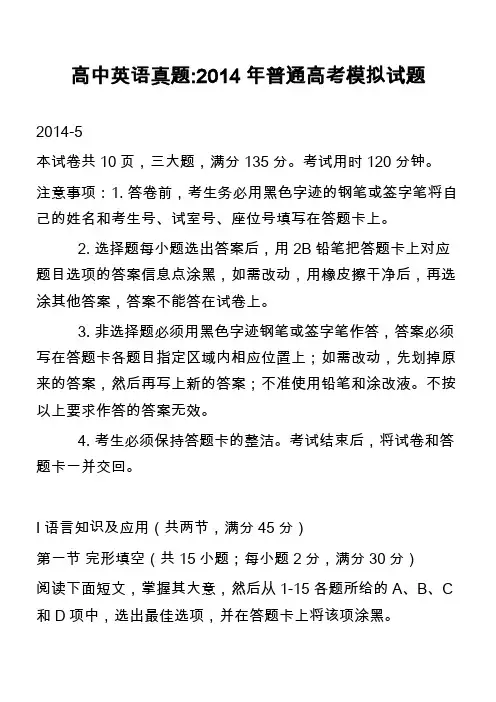
高中英语真题:2014年普通高考模拟试题2014-5本试卷共10页,三大题,满分135分。
考试用时120分钟。
注意事项:1. 答卷前,考生务必用黑色字迹的钢笔或签字笔将自己的姓名和考生号、试室号、座位号填写在答题卡上。
2. 选择题每小题选出答案后,用2B铅笔把答题卡上对应题目选项的答案信息点涂黑,如需改动,用橡皮擦干净后,再选涂其他答案,答案不能答在试卷上。
3. 非选择题必须用黑色字迹钢笔或签字笔作答,答案必须写在答题卡各题目指定区域内相应位置上;如需改动,先划掉原来的答案,然后再写上新的答案;不准使用铅笔和涂改液。
不按以上要求作答的答案无效。
4. 考生必须保持答题卡的整洁。
考试结束后,将试卷和答题卡一并交回。
I 语言知识及应用(共两节,满分45分)第一节完形填空(共15小题;每小题2分,满分30分)阅读下面短文,掌握其大意,然后从1-15各题所给的A、B、C 和D项中,选出最佳选项,并在答题卡上将该项涂黑。
Shyness can make people feel awkward, worried or tense on s ocial occasions. Shyness is the cause of much 1 for a great many people. Shy people often feel 2 and are self-conscious; that is, they are over concerned with their own 3 a nd actions. For example, they often ask themselves “Am I weari ng unattractive clothes?”Obviously, it is such a(n) 4 feeling that people must be affect ed unfavorably. A person’s self concept is reflected in the way h e or she 5 and affects other people's attitudes towards him or her. In general, the way people think about themselves has a d eep influence on all areas of their lives. Shy people, with low sel f-esteem(自尊),are likely to be passive and easily 6 by others. They nee d reassurance that they are doing “the 7 thing”. Shy people a re very 8 to criticism. It makes them feel inferior(低人一等).They also find it difficult to be 9 by pleasing words beca use they believe they are unworthy of it .A shy person may resp ond to a(n) 10 with a statement like this one:”You’re just sayi ng that to make me feel good .I know it's not true.”It is clear that, while self-awareness is a (n) 11 quality, overdoing it is harmful. Can sh yness be 12 got rid of, or at least reduced? Fortunately, peop le can make it with determination. It is important for people to accept their weaknesses as well as their 13 and remember th at it is 14 for them to label themselves inferior because each i ndividual is 15 and has his or her own characteristics.1.A. coldnessB. discomfortC. happinessD. excitement2.A. boredB. terrifiedC. anxiousD. enth usiastic3. A. thoughts B. appearances C. ideasD. words4.A. comfortableB. positiveC. pleasantD. unp leasant5.A. behavesB. saysC. playsD. claim s6.A. impressedB. cheatedC. persuadedD. i nfluenced7.A. wrongB. goodC. rightD. easy8.A. sensitiveB. usedC. insensitiveD. accusto med9.A. annoyedB. amusedC. delightedD. en tertained10.A. apologyB. punishmentC. promotionD. praise11.A. healthyB. unhealthyC. realisticD. prac tical12.A. mostlyB. completelyC. partlyD. generally13.A. shynessB. strengthsC. specialtiesD. sh ortcomings14.A. necessaryB. dangerousC. properD. unf air15.A. uniqueB. valuable D. admirableC. hopeful第二节语法填空(共10小题;每小题1.5分,满分15分)阅读下面短文,按照句子结构的语法性和上下文连贯的要求,在空格处填人一个适当的词或使用括号中词语正确形式填空,并将答案填写在答卷标号为16-25的相应位置上。
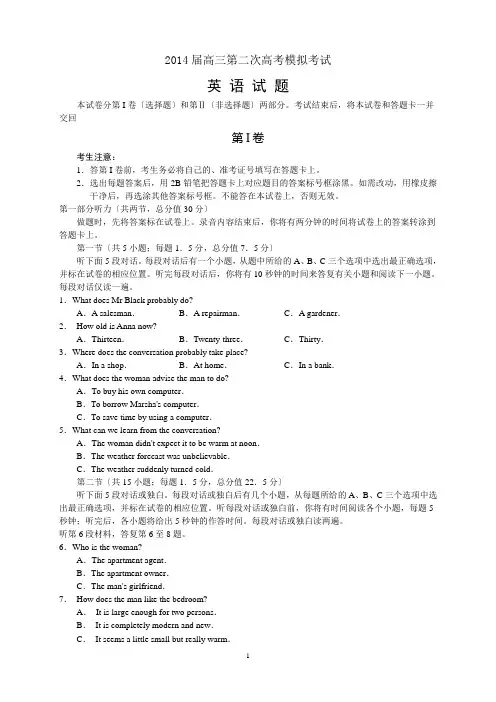
2014届高三第二次高考模拟考试英语试题本试卷分第I卷〔选择题〕和第Ⅱ〔非选择题〕两部分。
考试结束后,将本试卷和答题卡一并交回第I卷考生注意:1.答第I卷前,考生务必将自己的、准考证号填写在答题卡上。
2.选出每题答案后,用2B铅笔把答题卡上对应题目的答案标号框涂黑。
如需改动,用橡皮擦干净后,再选涂其他答案标号框。
不能答在本试卷上,否则无效。
第一部分听力〔共两节,总分值30分〕做题时,先将答案标在试卷上。
录音内容结束后,你将有两分钟的时间将试卷上的答案转涂到答题卡上。
第一节〔共5小题;每题1.5分,总分值7.5分〕听下面5段对话。
每段对话后有一个小题,从题中所给的A、B、C三个选项中选出最正确选项,并标在试卷的相应位置。
听完每段对话后,你将有10秒钟的时间来答复有关小题和阅读下一小题。
每段对话仅读一遍。
1.What does Mr Black probably do?A.A salesman.B.A repairman.C.A gardener.2.How old is Anna now?A.Thirteen.B.Twenty-three.C.Thirty.3.Where does the conversation probably take place?A.In a shop.B.At home.C.In a bank.4.What does the woman advise the man to do?A.To buy his own computer.B.To borrow Marsha's computer.C.To save time by using a computer.5.What can we learn from the conversation?A.The woman didn't expect it to be warm at noon.B.The weather forecast was unbelievable.C.The weather suddenly turned cold.第二节〔共15小题;每题1.5分,总分值22.5分〕听下面5段对话或独白。
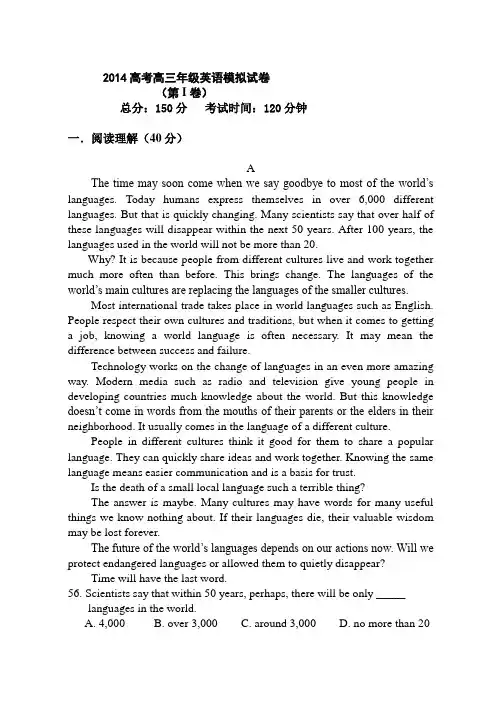
2014高考高三年级英语模拟试卷(第I卷)总分:150分考试时间:120分钟一.阅读理解(40分)AThe time may soon come when we say goodbye to most of the world’s languages. Today humans express themselves in over 6,000 different languages. But that is quickly changing. Many scientists say that over half of these languages will disappear within the next 50 years. After 100 years, the languages used in the world will not be more than 20.Why? It is because people from different cultures live and work together much more often than before. This brings change. The languages of the world’s main cultures are replacing the languages of the smaller cultures.Most international trade takes place in world languages such as English. People respect their own cultures and traditions, but when it comes to getting a job, knowing a world language is often necessary. It may mean the difference between success and failure.Technology works on the change of languages in an even more amazing way. Modern media such as radio and television give young people in developing countries much knowledge about the world. But this knowledge doesn’t come in words from the mouths of their parents or the elders in their neighborhood. It usually comes in the language of a different culture.People in different cultures think it good for them to share a popular language. They can quickly share ideas and work together. Knowing the same language means easier communication and is a basis for trust.Is the death of a small local language such a terrible thing?The answer is maybe. Many cultures may have words for many useful things we know nothing about. If their languages die, their valuable wisdom may be lost forever.The future of the world’s languages depends on our actions now. Will we protect endangered languages or allowed them to quietly disappear?Time will have the last word.56. Scientists say that within 50 years, perhaps, there will be only _____languages in the world.A. 4,000B. over 3,000C. around 3,000D. no more than 2057. In “The languages of the world’s main cultures are replacing thelanguages of the smaller cultures,” the verb “replace” means “_____”.A. to put something back into a correct placeB. to use a second thing in place of the first thingC. to find good place for somethingD. to decide how important something is58. The passage says that if all the people in the world knew a major worldlanguage, _____.A. radio and television would all use the languageB. it would be easier for them to share their ideasC. lessons at schools would be taught in the languageD. people would respect their own culture more59. Also, the passage says that if nobody spoke the languages of smallercultures, _____.A. Many of the words for things we do not know would be lost.B. knowledge would come from the mouths of the eldersC. people would have difficult in working togetherD. there would be no smaller cultures.60. By saying “Time will have the last word,” the writer means “ _____”.A. let us wait and seeB. we have time to do somethingC. it is too late to do anythingD. it is only a problem of timeBPeople who are cheerful and relaxed are less likely to suffer from colds. It’s possible that being full of vim and vigor helps the body fight illnesses, say the researchers from Carnegie Mellon University (CMU) in Pittsburgh.“We need to take more seriously the possibility that a positive emotional style is a major player in disease risk,” says psychologist Sheldon Cohen, the study’s lead researcher.In a previous study, Cohen and his colleagues found that people who tended to be cheerful and lively were least likely to develop sniffles, coughs, and other cold symptoms.Those findings were interesting, but they didn’t prove that a person’s attitude affects whether he or she gets sick. Instead, it was still probable that a person’s underlying personality is what matters.Evidence suggests, for instance, that certain people are naturally more likely to be outgoing and optimistic, with high self-respect and a sense of2control over life. This would mean that who we are, not how we feel, finally decides our chances of catching colds.To figure out which mattered more (personality or emotions). The CMU team interviewed 193 healthy adults. The researchers talked to each person over the phone every evening for 2 weeks. They told the researchers about the positive and negative feelings that they had experienced that day.The results showed that everyone in the study was equally likely to get infected. Their symptoms, however, differed depending on the types of emotions that they had reported over the previous 2 weeks.Among those who reported good moods and had been infected with the flu virus, for example, 28 percent developed coughs and stuffy (堵塞) noses. On the other hand, those symptoms struck 41 percent of people who had been less positive. Scientists argue about whether negative emotions or positive emotions have a stronger effect on how healthy we are, For now, it can not hurt to look on the bright side more often than not.61. What is the text mainly about?A. How to get rid of colds.B. Attitude determines life.C. Smiles turn away colds.D. Different opinions about colds.62.The phrase”full of vim and vigor” underlined in Paragraph 1 probablymeans___________.A.ignorantB. Well-informedC. energeticD. in low spirits63.According to the research, persons who are likely to catch colds should bethose __________?A. Who have negative attitude towards their life.B. Who are very emotional and optimistic.C. Who are open-minded and outgoing.D. Who have trouble with their noses64.The last paragraph implies that __________.A.positive and negative emotions have good aspects.B.people who have been less positive tend to catch colds.C.Keeping an optimistic state of mind is good for health.D.positive emotions have a stronger effect on health.C高三英语第3页Comic Strips(连环漫画)For hundreds of years, artists have used cartoons to criticize bad rulers or landowners. As early as the 19th century, people produced and read books of drawing. In many ways, they were similar to modern comics. They contained stories of naughty children and playful animals. The owl(猫头鹰)and the elephant were usually wise animals, ready to give advice. The lion and the tiger were brave. The fox and the wolf were cunning(狡猾的)greedy(贪婪的)and dangerous.A century ago, an American newspaper published the first full-colour comic strip. It was so popular that sales of the newspaper, Morning Journal, increased quickly. Since then, newspapers throughout the world have included comic strips.In modern times, comics are popular in China, Japan, the USA and almost everywhere. Not even video games or CD-ROMs have reduced their popularity. Names such as Snoopy, Woodstock and Garfield are well known in dozens of countries. The Peanuts comic strip appears in over 2,000 newspapers and in more than 25 languages. People believe that its creator, Charles M. Schultz, earned US$60 million a year.Perhaps one day, you may like to create your own comic strip and become a millionaire. First, you must think of a good plot. It should be funny, exciting or interesting in some way. It should have plenty of action. Moreover, the language must be realistic and simple. The words should suit the characters in your story. One type of person might say, “Please be quiet and listen to what we have to say.” But another type of character might simply say, “Shut up and listen!”Furthermore, the characters in your story must be clear to readers. They should be obviously good or bad ---- and not a mixture of both. A leader must be stronger or cleverer than his or her followers. In many comic strips ---- especially those showing crime of adventure ---- there should also be a hero or heroine. This will attract the reader to keep on reading the story.65. The underlined word “plot” is similar in meaning to _____.A. placeB. stripC. storyD. character66. Which of the following is NOT the name of a cartoon Character?A. Snoopy.B. Peanuts.C. Woodstock.D. Garfield.67. In the 19th century, the wolf in the cartoons was NOT _____.A. cunningB. dangerousC. greedyD. brave4DMeetings don’t just eat up time in the workplace ; they actually make groups of people stupider, says new research.Working in a group makes people perform worse on intelligence tests, as some group members are so anxious about doing well that they “divert”their brain towards maintaining their social status in the group.You may joke about how committee meetings make you feel brain dead, but our findings suggest that they make you act brain dead as well, said Read Montague the study leader at Virginia Tech.Groups of volunteers showed measurable drops in IQ when asked to perform intelligence tests socially, with the results broadcast to the group.Some people performed well in the “social”tests, but others were affected badly--- and overall,performance dropped.Women appear to feel this pressure more than men---only three out of 13 female volunteers performed well in a social environment, with 10 out of 13 finding that their performance dropped.The researchers used a magnetic resonance imaging (MRI) scanner to monitor how people’s brains responded--- and found that bad performers tended to show activity in parts of their brain that dealt with emotions and anxiety.“We started with individuals who were matched for their IQ,”said Montague. “Yet when we placed them in small groups, ranked their performance on tasks against their peers, and broadcast the rankings, we saw dramatic drops in the ability of some study subjects to solve problems.”“Our study highlights the unexpected and dramatic consequences even subtle social signals in group settings may have on the individual,” said lead author Keneth Kishida.“We don’t know how much these effects are present in real-world settings. By placing an emphasis on competition, for example, are we missinga large segment of the talent pool?”68. Which of the following statements is Not true according to thepassage?A. Meetings make groups of people stupider.B. Meetings make you act brain dead.C. Meetings make people perform worse on intelligence tests.高三英语第5页D. Meetings don’t affect men’s performance in intelligence tests.69. This passage can be classified as __________.A. An advertisementB.a book reviewC. A feature storyD.a science report70.What would be the best title of the text?A. Brainstorming? More Like Brain DrainB. Brainstorming Affects People”s IQ TestC. Brainstorming Makes People Act Brain DeadD.Brainstorming Affects Women’s PerformanceE根据短文内容,从短文后的选项中选出能填入空白处的最佳选项。
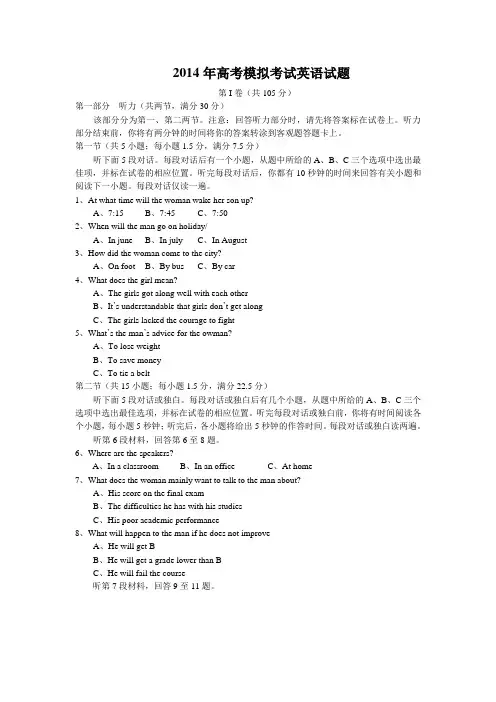
2014年高考模拟考试英语试题第I卷(共105分)第一部分听力(共两节,满分30分)该部分分为第一、第二两节。
注意:回答听力部分时,请先将答案标在试卷上。
听力部分结束前,你将有两分钟的时间将你的答案转涂到客观题答题卡上。
第一节(共5小题;每小题1.5分,满分7.5分)听下面5段对话。
每段对话后有一个小题,从题中所给的A、B、C三个选项中选出最佳项,并标在试卷的相应位置。
听完每段对话后,你都有10秒钟的时间来回答有关小题和阅读下一小题。
每段对话仅读一遍。
1、At what time will the woman wake her son up?A、7:15B、7:45C、7:502、When will the man go on holiday/A、In juneB、In julyC、In August3、How did the woman come to the city?A、On footB、By busC、By car4、What does the girl mean?A、The girls got along well with each otherB、It’s understandable that girls don’t get alongC、The girls lacked the courage to fight5、What’s the man’s advice for the owman?A、To lose weightB、To save moneyC、To tie a belt第二节(共15小题;每小题1.5分,满分22.5分)听下面5段对话或独白。
每段对话或独白后有几个小题,从题中所给的A、B、C三个选项中选出最佳选项,并标在试卷的相应位置。
听完每段对话或独白前,你将有时间阅读各个小题,每小题5秒钟;听完后,各小题将给出5秒钟的作答时间。
每段对话或独白读两遍。
听第6段材料,回答第6至8题。
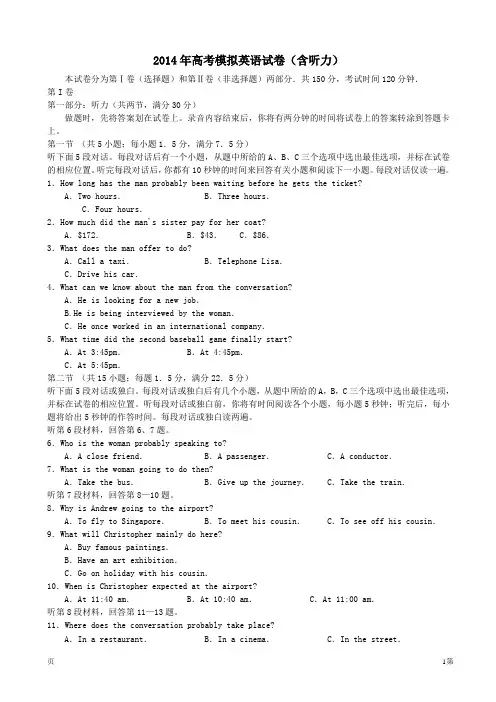
2014年高考模拟英语试卷(含听力)本试卷分为第Ⅰ卷(选择题)和第Ⅱ卷(非选择题)两部分.共150分,考试时间120分钟.第I卷第一部分:听力(共两节,满分30分)做题时,先将答案划在试卷上。
录音内容结束后,你将有两分钟的时间将试卷上的答案转涂到答题卡上。
第一节(共5小题;每小题1.5分,满分7.5分)听下面5段对话。
每段对话后有一个小题,从题中所给的A、B、C三个选项中选出最佳选项,并标在试卷的相应位置。
听完每段对话后,你都有10秒钟的时间来回答有关小题和阅读下一小题。
每段对话仅读一遍。
1.How long has the man probably been waiting before he gets the ticket?A.Two hours.B.Three hours.C.Four hours.2.How much did the man's sister pay for her coat?A.$172.B.$43.C.$86.3.What does the man offer to do?A.Call a taxi. B.Telephone Lisa.C.Drive his car.4.What can we know about the man from the conversation?A.He is looking for a new job.B.He is being interviewed by the woman.C.He once worked in an international company.5.What time did the second baseball game finally start?A.At 3:45pm.B.At 4:45pm.C.At 5:45pm.第二节(共15小题;每题1.5分,满分22.5分)听下面5段对话或独白。
每段对话或独白后有几个小题,从题中所给的A,B,C三个选项中选出最佳选项,并标在试卷的相应位置。
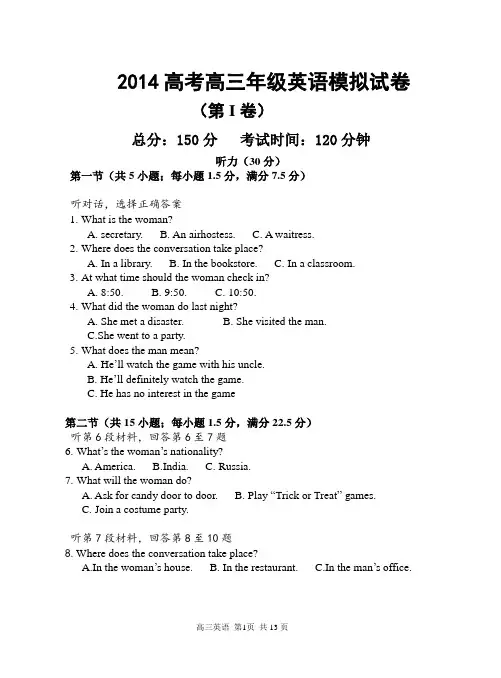
2014高考高三年级英语模拟试卷(第I卷)总分:150分考试时间:120分钟听力(30分)第一节(共5小题;每小题1.5分,满分7.5分)听对话,选择正确答案1.What is the woman?A. secretary.B. An airhostess.C. A waitress.2.Where does the conversation take place?A. In a library.B. In the bookstore.C. In a classroom.3.At what time should the woman check in?A. 8:50.B. 9:50.C. 10:50.4.What did the woman do last night?A. She met a disaster.B. She visited the man.C.She went to a party.5.What does the man mean?A. He’ll watch the game with his uncle.B. He’ll definitely watch the game.C. He has no interest in the game第二节(共15小题;每小题1.5分,满分22.5分)听第6段材料,回答第6至7题6.What’s the woman’s nationality?A. America.B.India.C. Russia.7.What will the woman do?A. Ask for candy door to door.B. Play “Trick or Treat” games.C. Join a costume party.听第7段材料,回答第8至10题8.Where does the conversation take place?A.In the woman’s house.B. In the restaurant.C.In the man’s office.9.How did the woman learn cooking?A. By learning by herself.B. By studying in college.C.By taking cooking courses.10.Why does the man have to leave now?A. He got an urgent call.B. He has to make a call.C. He has to repair his phone.听第8段材料,回答第11至13题11.What does the woman do in the company?A. She’s an office clerk.B.She’s the sales manager.C. She’s the photographer.12.What can we learn about the man?A. He has been here for three years.B. He is a new employee.C.He is satisfied with his job.13.What does the man think of their boss?A. He is easy-going.B. He is strict.C. He is friendly.听第9段材料,回答第14至16题14.What is the woman most probably?A. A tour guide.B. A saleswoman.C. A dance coach.15.What does the woman offer to the man?A. Special airfares to Hawaii.B. A membership to a sports club.C. Special price for dance lessons.16.What will the woman do?A. Never call the man again.B. Call the man later.C.Have others call the man.听第10段材料,回答第17至20题17.What is displayed in the entrance hall?A. Som photos of the town.B.Some pictures of gardens.C. Some famous clocks.18.How old is the oldest clock?A.115 years old.B.150 years old.C.400 years old.19.What is the price of the guide book for kids?A.1.50 pounds.B.1 pounds.C.50 pence.20.How many times does the museum open each week?A.Five timesB.Three timesC.Twice.II.单项填空(15分)21.It is widely accepted that failure will help you get_______ betterunderstanding of _______ life, though it is hard for the young to face.A. a, theB. the, aC./, theD. a, /22. _______ in the Global Financial Crisis, the company is having a hard time.A. Getting stickingB. Getting stuckC. To get stuckD. To get sticking23. The pilot asked all the passengers on board to remain_________ as the planelanded.A. seatB. seatingC. seatedD. to be seating24. Teachers recommend parents_______ their children under 12 to ride bicyclesto school for safety..A.not allowB.did not allowC.mustn’t allowD. couldn’t allow25. The hungry man eats his food _______he hadn't eaten for a week.A. as ifB. even thoughC. such asD. like as26.She is the only one among the _______ authors who ________ detective story.A. woman, has written aB.women,have written aC.women, has written aD.woman, have written a27. He has got himself into a dangerous situation ________he is likely to loseeverything he has.A. whereB. thatC. whichD. whose28. ---- Excuse me. _____?---- That’s $5 altogether, sir.A. Could I have the bill, pleaseB. Can I order, pleaseC. How much is the meal we’ve hadD. Please count the money, will you29. With winter ________ on, it 's time to buy warm clothes.A. cameB. comesC. comeD. coming30. I feel it is your husband who ________ for the spoiled child.A. is to blameB. is going to blameC. is to be blamedD. should blame31. --- Why did I do it wrongly?--- Because you have ______some figures ____in your calculations.A. left; overB. left; behindC. left; onD. left; out32. President Hu went to attend the summit meeting held in Singapore; ________,he met with many leaders of other countries.A. meanwhileB. thereforeC. plusD. then33. If he had trained hard, he would have _______ a good footballer.A. turnedB. grownC. madeD. got34. With so many people crowding into Jinan to watch the national Games, this isthe only room __________ in our hotel.A. presentB. availableC. preciousD. convenient35. The greatness of the Forbidden City strongly impressed _______ PresidentObama’s memory.A. toB. overC. byD. onIII.完型填空(30分)I was really frightened that night.My elder brother was so angry that he looked like a 36 tiger that wanted to take its revenge (复仇) on its captors (捕捉者). It seemed that a powerful storm would soon 37 . Then I 38 that there was a lot of noise. Was my brother going to fight someone?I was too 39 to sit still. I rushed out of my classroom as quickly as possible. Looking down from the third floor of our building, I could see nobody. Where did they go? 40 , I seemed to hear 41 upstairs. I rushed there and knew that they were in the 42 , arguing.I couldn't help 43 out loud: "Brother! Brother!" He 44 me and answered, "What?" "Come here!" I shouted. He came out to me. "What are you 45 for? Come away at once!" I pulled at his clothes to get him to come with me.But I 46 . He pushed me away, saying: "Don't worry about me. It will be OK in a minute. It's only a little trouble. Just go back to class."With these words, he went back to the toilet again.At that moment, the class teacher 47 . "What's happening in there?" he asked anxiously."I don't know, but I guess they are going to 48 !" I answered."Don't worry, let me 49 them." Then he asked me to go away.After class, I went to ask my brother why he 50 fought with the others but he didn't want to tell me.I think it was wrong for my brother to get into the fight, 51 was stopped before it actually started. Maybe he has his reasons, but he should think about how others will feel about this. What's more, as students, we should learn to 52others' mistakes and solve problems 53 talking.It's the same between countries in dealing with problems. 54 big the issue is, fighting should always be the 55 thing in every one's mind.36. A. tired B. cheated C. caught D. disappointed37. A. defeat B. fight C. break D. fall38. A. realized B. knew C. guessed D. found39. A. surprised B. worried C. pleased D. hurried40. A. However B. Immediately C. Especially D. Suddenly41. A. someone B. something C. anyone D. anything42. A. classroom B. bedroom C. toilet D. library43. A. crying B. to cry C. cried D. having cried44. A. knew B. realized C. replied D. recognized45. A. looking B. searching C. arguing D. agreeing46. A. failed B. waited C. lost D. tried47. A. turned down B. turned to C. turned out D. turned up48. A. run B. cheat C. fight D. trick49. A. deal with B. fight with C. start with D. joke with50. A. hardly B. nearly C. barely D. closely51. A. what B. that C. which D. it52. A. forget B. respect C. follow D. forgive53. A. in B. with C. by D. beyond54. A. No matter B. No matter howC. No wonderD. No matter whether55. A. last B. least C. latest D. limitIV.阅读理解(40分)AThe time may soon co me when we say goodbye to most of the world’s languages. Today humans express themselves in over 6,000 different languages. But that is quickly changing. Many scientists say that over half of these languages will disappear within the next 50 years. After 100 years, the languages used in the world will not be more than 20.Why? It is because people from different cultures live and work together much more often than before. This brings change. The languages of the world’s main cultures are replacing the languages of the smaller cultures.Most international trade takes place in world languages such as English.People respect their own cultures and traditions, but when it comes to getting a job, knowing a world language is often necessary. It may mean the difference between success and failure.Technology works on the change of languages in an even more amazing way. Modern media such as radio and television give young people in developing countries much knowledge about the world. But this knowledge doesn’t co me in words from the mouths of their parents or the elders in their neighborhood. It usually comes in the language of a different culture.People in different cultures think it good for them to share a popular language. They can quickly share ideas and work together. Knowing the same language means easier communication and is a basis for trust.Is the death of a small local language such a terrible thing?The answer is maybe. Many cultures may have words for many useful things we know nothing about. If their languages die, their valuable wisdom may be lost forever.The future of the world’s languages depends on our actions now. Will we protect endangered languages or allowed them to quietly disappear?Time will have the last word.56. Scientists say that within 50 years, perhaps, there will be only _____ languagesin the world.A. 4,000B. over 3,000C. around 3,000D. no more than 2057. In “The languages of the world’s main cultures are replacing the languages ofthe smaller cultures,” the verb “replace” means “_____”.A. to put something back into a correct placeB. to use a second thing in place of the first thingC. to find good place for somethingD. to decide how important something is58. The passage says that if all the people in the world knew a major worldlanguage, _____.A. radio and television would all use the languageB. it would be easier for them to share their ideasC. lessons at schools would be taught in the languageD. people would respect their own culture more59. Also, the passage says that if nobody spoke the languages of smaller cultures,_____.A. Many of the words for things we do not know would be lost.B. knowledge would come from the mouths of the eldersC. people would have difficult in working togetherD. there would be no smaller cultures.60. By saying “Time will have the last word,” the writer means “ _____”.A. let us wait and seeB. we have time to do somethingC. it is too late to do anythingD. it is only a problem of timeBPeople who are cheerful and relaxed are less likely to suffer from colds. It’s possible that being full of vim and vigor helps the body fight illnesses, say the researchers from Carnegie Mellon University (CMU) in Pittsburgh.“We need to take more seriously the possibility that a positive emotional style is a major player in disease risk,”says psychologist Sheldon Cohen, the study’s lead researcher.In a previous study, Cohen and his colleagues found that people who tended to be cheerful and lively were least likely to develop sniffles, coughs, and other cold symptoms.Those findings were interesting, but they didn’t prove that a person’s attitude affects whether he or she gets sick. Instead, it was still probable that a person’s underlying personality is what matters.Evidence suggests, for instance, that certain people are naturally more likely to be outgoing and optimistic, with high self-respect and a sense of control over life. This would mean that who we are, not how we feel, finally decides our chances of catching colds.To figure out which mattered more (personality or emotions). The CMU team interviewed 193 healthy adults. The researchers talked to each person over the phone every evening for 2 weeks. They told the researchers about the positive and negative feelings that they had experienced that day.The results showed that everyone in the study was equally likely to get infected. Their symptoms, however, differed depending on the types of emotions that they had reported over the previous 2 weeks.Among those who reported good moods and had been infected with the flu virus, for example, 28 percent developed coughs and stuffy (堵塞) noses. On the other hand, those symptoms struck 41 percent of people who had been less positive. Scientists argue about whether negative emotions or positive emotions have a stronger effect on how healthy we are, For now, it can not hurt to look on the bright side more often than not.61. What is the text mainly about?A. How to get rid of colds.B. Attitude determines life.C. Smiles turn away colds.D. Different opinions about colds.62.The phrase”full of vim and vigor” underlined in Paragraph 1 probablymeans___________.A.ignorantB. Well-informedC. energeticD. in low spirits63.According to the research, persons who are likely to catch colds should bethose __________?A. Who have negative attitude towards their life.B. Who are very emotional and optimistic.C. Who are open-minded and outgoing.D. Who have trouble with their noses64.The last paragraph implies that __________.A.positive and negative emotions have good aspects.B.people who have been less positive tend to catch colds.C.Keeping an optimistic state of mind is good for health.D.positive emotions have a stronger effect on health.CComic Strips(连环漫画)For hundreds of years, artists have used cartoons to criticize bad rulers or landowners. As early as the 19th century, people produced and read books of drawing. In many ways, they were similar to modern comics. They contained stories of naughty children and playful animals. The owl(猫头鹰)and the elephant were usually wise animals, ready to give advice. The lion and the tiger were brave. The fox and the wolf were cunning(狡猾的)greedy(贪婪的)and dangerous.A century ago, an American newspaper published the first full-colour comic strip. It was so popular that sales of the newspaper, Morning Journal, increased quickly. Since then, newspapers throughout the world have included comic strips.In modern times, comics are popular in China, Japan, the USA and almost everywhere. Not even video games or CD-ROMs have reduced their popularity. Names such as Snoopy, Woodstock and Garfield are well known in dozens of countries. The Peanuts comic strip appears in over 2,000 newspapers and in more than 25 languages. People believe that its creator, Charles M. Schultz, earned US$60 million a year.Perhaps one day, you may like to create your own comic strip and become amillionaire. First, you must think of a good plot. It should be funny, exciting or interesting in some way. It should have plenty of action. Moreover, the language must be realistic and simple. The words should suit the characters in your story. One type of person might say, “Please be quiet and listen to what we have to say.” But another type of character might simply say, “Shut up and listen!”Furthermore, the characters in your story must be clear to readers. They should be obviously good or bad ---- and not a mixture of both. A leader must be stronger or cleverer than his or her followers. In many comic strips ---- especially those showing crime of adventure ---- there should also be a hero or heroine. This will attract the reader to keep on reading the story.65. The underlined wo rd “plot” is similar in meaning to _____.A. placeB. stripC. storyD. character66. Which of the following is NOT the name of a cartoon Character?A. Snoopy.B. Peanuts.C. Woodstock.D. Garfield.67. In the 19th century, the wolf in the cartoons was NOT _____.A. cunningB. dangerousC. greedyD. braveDMeetings don’t just eat up time in the workplace ; they actually make groups of people stupider, says new research.Working in a group makes people perform worse on intelligence tests, as some group members are so anxious about doing well that they “divert” their brain towards maintaining their social status in the group.You may joke about how committee meetings make you feel brain dead, but our findings suggest that they make you act brain dead as well, said Read Montague the study leader at Virginia Tech.Groups of volunteers showed measurable drops in IQ when asked to perform intelligence tests socially, with the results broadcast to the group.Some people performed well in the “social” tests, but others were affected badly--- and overall,performance dropped.Women appear to feel this pressure more than men---only three out of 13 female volunteers performed well in a social environment, with 10 out of 13 finding that their performance dropped.The researchers used a magnetic resonance imaging (MRI) scanner to monitor how people’s brains responded--- and found that bad performers tended toshow activity in parts of their brain that dealt with emotions and anxiety.“We started with individuals who were matched for their IQ,”said Montague. “Yet when we placed them in small groups, ranked their performance on tasks against their peers, and broadcast the rankings, we saw dramatic drops in the ability of some study subjects to solve problems.”“Our study highlights the unexpected and dramatic consequences even subtle social signals in group settings may have on the individual,”said lead author Keneth Kishida.“We don’t know how much these effects are present in real-world settings. By placing an emphasis on competition, for example, are we missing a large segment of the talent pool?”68. Which of the following statements is Not true according to the passage?A. Meetings make groups of people stupider.B. Meetings make you act brain dead.C. Meetings make people perform worse on intelligence tests.D. Meetings don’t affect men’s performance in intelligence tests.69. This passage can be classified as __________.A. An advertisementB.a book reviewC. A feature storyD.a science report70.What would be the best title of the text?A. Brainstorming? More Like Brain DrainB. Brainstorming Affects People”s IQ TestC. Brainstorming Makes People Act Brain DeadD.Brainstorming Affects Women’s PerformanceE根据短文内容,从短文后的选项中选出能填入空白处的最佳选项。
西安市2014高考英语阅读理解训练〔9〕与答案【2014高考英语模拟试题】BEurope is home to a variety of cultural treasures. Lonely Planet, the world’s largest travel guide publisher, has offered pairs of cities for culturehungry but timepoor travelers.London and ParisIt takes you about two hours to travel from London to Paris by Eurostar, a high-speed railway service. The two capital cities have been competing in fashion, art and nightlife for decades-but each secretly looks up to the other.No one can doubt the grand and impressive beauty of Paris' LouvreMuseum, but if you want to save money, you cannot skip the BritishMuseum free to visit. Compared with London, Paris has more outdoor attractions such as the beautiful green walkway La Promenade Plantee.In Paris, you'll see diners linger over red wine. While in London, you can try some afternoon tea, eat fish and chips or salted cake.Vienna and BratislavaAustrian capital Vienna and Slovakia city Bratislava are an hour apart by train. But since they are linked by the DanubeRiver, the best way to travel is by ship. A tour of the two cities is the perfect way to experience everything from 17th century's Habsburg dynasty splendor to scifi restaurants.Vienna is famous for Mozart and imperial palaces. You can appreciate the perfect blending of architecture and nature in the grand SchonbrunnPalace, and reward yourself with a cup of Vienna coffee, which has made its way to the world's cultural heritage list.Bratislava is best known for its fine dining-the remarkable UFO restaurant. You can enjoy a meatladen dinner here in an amazing setting.60.What's the relationship between London and Paris according to the text?A. They help each other.B. They attack each other.C. They admire each other.D. They don't like each other.61.What are the advantages of Paris mentioned in the article?a. The Louvre Museumb. Free access to museumsc. More outdoor attractionsd. Better wines and perfumesA. acB. cdC. acdD. bcd62.Which of the cities should you choose if you are interested in scifi restaurants?A. London.B. Paris.C. Glasgow.D. Bratislava.63.Lonely Planet recommends these two pairs of cities because________.A. they are not expensive to visitB.they are best known to the worldC.they are always enemies between each otherD.they are close but different in many aspectsB【解题导语】本文主要介绍了两组对于旅游者来说不容错过的欧洲城市:伦敦和巴黎,维也纳和布拉迪斯拉发。
2014高考英语听力模拟试题及答案九(含音频)所属专题:2016高考英语听力试题及答案(含音频)来源:互联网要点:高考英听力模拟练习编辑点评: 2014高考英语听力模拟试题,帮助考生在英语听力方面进行单独的训练,从而提高自己的单项能力,将英语听力变为自己的强项,另附音频和文档下载。
∙[1]试卷∙[2]参考答案本文相关应用∙鼠标划词∙收藏∙评论∙打印高考英语听力模拟试题(九)第一节(共5小题;每小题1.5 分,满分7.5 分)1. At what time did the dialogue happen?A. At 7: 00.B. At 6:30.C. At 6:00.2. Who never enjoys shopping?A. Mr. Clarke.B. Mrs. Clarke.C. Miss Clarke.3. What does the woman want to buy?A. Cameras.B. Pictures.C. Films.4. What does the woman mean?A. Joan should test driving a few cars before making a decision.B. Joan should make a decision before testing driving.C. Joan should buy the car that she drives first.5. What does the man mean?A. He doesn't like rainy weather.B. He’s afraid of getting sunburned.C. The weather is not suitable for tile beach.第二节(共15小题;每小题1.5分,满分22.5分)听第6 段材料,回答第6-8 题。
以下是为⼤家整理的关于2014⾼考英语模拟试卷的⽂章,供⼴⼤考⽣查阅!! 2014年英语最新⾼考模拟题英语试题本试卷共150分。
考试时长120分钟。
考⽣务必将答案答在答题卡上,在试卷上作答⽆效。
考试结束后,将本试卷和答题卡⼀并交回。
第⼀部分:听⼒理解(共三节,30分)第⼀节(共5⼩题;每⼩题1.5分,满分7.5分)听下⾯5段对话。
每段对话后有⼀道⼩题,从每题所给的A、B、C三个选项中选出选项。
听完每段对话后,你将有10秒钟的时间来回答有关⼩题和阅读下⼀⼩题。
每段对话你将听⼀遍。
1. What will the man and woman probably do?A. Stay where they are.B. Go for a walk.C. Go to a coffee shop.2. What is the woman probably doing?A.Asking for help.B. Making an appointment.C. Giving advice.3.What does the man want to do now?A.Prepare the schedule.B. Talk about the schedule.C. Take a rest.4. What does the woman feel about the US?A.Bored.B. Curious.C.Disappointed.5. When will the woman meet with Mr.Smith?A. 12: 00.B. 1:30.C. 2:OO.第⼆节(共10⼩题;每⼩题1.5分,共15分)听下⾯4段对话或独⽩。
每段对话或独⽩后有⼏道⼩题,从每题所给的A、B、C三个选项中选出选项。
听每段对话或独⽩前,你将有5秒钟的时间阅读每⼩题。
听完后,每⼩题将给出5秒钟的作答时间。
每段对话或独⽩你将听两遍。
高考模拟试题精编(一)【说明】本试卷分第Ⅰ卷(选择题)和第Ⅱ卷(非选择题)两部分。
满分150分,时间120分钟。
第一部分听力(共两节,满分30分)第一节(共5小题;每小题1.5分,满分7.5分)听下面5段对话。
每段对话后有一个小题,从题中所给的A、B、C三个选项中选出最佳选项,并标在试卷的相应位置。
听完每段对话后,你都有10秒钟的时间来回答有关小题和阅读下一小题。
每段对话仅读一遍。
1.What does the man mainly do in his spare time now?A.He does some sports.B.He plays the piano. C.He learns a language.2.Why is the woman upset?A.She missed watching the game. B.She failed in the exam. C.She didn't win the match.3.When will the two speakers meet?A.At 9:30. B.At 10:00. C.At 11:30.4.What does the man suggest doing?A.Taking a taxi. B.Waiting for the bus. C.Taking another bus. 5.How will the woman deal with the money?A.She will save most of it. B.She will give it to the man. C.She will buy a lot of clothes.第二节(共15小题;每小题1.5分,满分22.5分)听下面5段对话。
每段对话后有几个小题,从题中所给的A、B、C三个选项中选出最佳选项,并标在试卷的相应位置。
听每段对话前,你将有时间阅读各个小题,每小题5秒钟;听完后,各小题给出5秒钟的作答时间。
2014年普通高等学校招生全国统一考试模拟试题英语注意事项:1. 本试卷分第I卷(选择题)和第II卷(非选择题)两部分,第I卷1至8页,第II卷9至10页。
2. 答题前,考生务必将自己的姓名、准考证号填写在本试卷相应的位置。
3. 全部答案在答题卡上完成,答在本试卷上无效。
4. 第I卷听力部分满分30分,不计入总分,考试成绩录取时提供给高校作参考。
5. 考试结束后,将本试卷和答题卡一并交回。
第I卷第二部分阅读理解(共两节,满分40分)第一节(共15小题;每小题2分,满分30分)AEP Portable HeaterWe all know that the cost of heating our homes will continue to be a significant burden on the family budget. Now millions of people are saving on their heating bills with the EP Portable Heater. With over one million satisfied customers around the world, the new EP heats better and faster, saves more on heating bills, and runs almost silent.The EP has no exposed heating parts that can cause a fire. The outside of EP only gets warm to the touch so that it will not burn children or pets.The EP will not reduce oxygen in the room. With other heaters, you’ll notice that you get sleepy when the heat comes on because they are burning up oxygen.The advanced EP also heats the room evenly, wall to wall and floor to ceiling. it comfortably covers an area up to 350 square feet. Other heaters heat rooms unevenly with most of the heat concentrated to the center of the room. And they only heat an area a few feet around the heater. With the EP, the temperature will not vary in any part of the room.The EP comes with a 3-year warranty(保修) and a 60-day. no questions asked. Satisfaction guarantee. If you are not totally satisfied, return it to our expertise and your money will be given back to you.Now, we have a special offer for 10 days, during which you can enjoy a half price discount and a free delivery. if you order that, we reserve the right to either accept or reject order requests at the discounted price.Take action right now!21. What is mainly discussed in paragraph 2?A. the heat of the EPB. the safety of the EPC. the appearance of the EPD. the material of the EP22. From the passage, we can learn that the EP____.A. doesn’t burn up oxygenB. runs without any noiseC. makes people get sleepyD. is unsuitable for children and pets23. The und erlined word “evenly” in paragraph 4 probably means____.A. continuouslyB. separatelyC. quicklyD. equally24. The main purpose of the passage is to____.A. persuade people to buy the productB. advise people to save on heating billsC. report the new development of portable heatersD. compare the difference of different heart brandsBThey baby is just one day old and has not yet left hospital. She is quiet but alert (警觉). Twenty centimeters from her face researchers have placed a white card with two black spots on it. She stares at it carefully. A researcher removes the card and replaces it by another, this time with the spots differently spaced. As the cards change from one to the other, her gaze(凝视)starts to lose its focus —until a third, with three black spots, is presented. Her gaze returns: she looks at it for twice as long as she did at the previous card. Can she tell that the number two is different from three, just 24 hours after coming into the world?Or do newborns simply prefer more to fewer? The same experiment, but with three spots shown before two, shows the same return of interest when the number of spots changes. Perhaps it is just the newness? When slightly older babies were shown cards with pictures of objects (a comb, a key, an orange and so on), changing the number of objects had an effect separate from changing the objects themselves. Could it be the pattern that two things make, as opposed to three? No again. Babies paid more attention to squares moving randomly on a screen when their number changed from two to three, or three to two. The effect even crosses between senses. Babies who were repeatedly shown two spots became more excited when they then heard three drumbeats than when they heard just two; likewise (同样地)when the researchers started with drumbeats and moved to spots.25. The experiment described in Paragraph 1 is related to the baby’s__.A. sense of hearingB. sense of sightC. sense of touchD. sense of smell26. Babies are sensitive to the change in______.A. the size of cardsB. the colour of picturesC. the shape of patternsD. the number of objects27. Why did the researchers test the babies with drumbeats?A. To reduce the difficulty of the experiment.B. To see how babies recognize sounds.C. To carry their experiment further.D. To keep the babies’ interest.28. Where does this text probably come from?A. Science fiction.B. Children’s literature.C. An advertisement.D. A science report.CDoes Fame Drive You Crazy?Although being famous might sound like a dream come true, today’s star, feeling like zoo animals, face pressures that few of us can imagine. They are at the center of much of the world’s attention. Paparazzi (狗仔队) camp outside their homes, cameras ready. Tabloids (小报) publish thrilling stories about their personal lives. Just imagine not being able to do anything without being photographed or interrupted for a signature.According to psychologist Christina Villareal, celebrities — famous people — worry constantly about their public appearance. Eventually, they start to lose track of who they really are, seeing themselves the way their fans imagine them, not as the people they were before everyone knew their names. “Over time,” Villareal says, “they feel separated and alone.”The phenomenon of tracking celebrities has been around for ages. In the 4th century B.C., painters followed Alexander the Great into battle, hoping to picture his victories for his admirers. When Charles Dickens visited America in the 19th century, his sold-out readings attracted thousands of fans, leading him to complain (抱怨) about his lack of privacy. Tabloids of the 1920s and 1930s ran articles about film-stars in much the same way that modern tabloids and websites do.Being a public figure today, however, is a lot more difficult than it used to be. Superstars cannot move about without worrying about photographers with modern cameras. When they say something silly or do something ridiculous, there is always the Internet to spread the news in minutes and keep their “story” alive forever.If fame is so troublesome, why aren’t all celebrities running away from it? The answer is there are still ways to deal with it. Some stars stay calm by surrounding themselves with trusted friends and family or by escaping to remote places away from big cities. They focus not on how famous they are but on what they love to do or whatever made them famous in the first place.Sometimes a few celebrities can get a little justice. Still, even stars who enjoy full justice often complain about how hard their lives are. They are tired of being famous already.29. It can be learned from the passage that stars today____.A. are often misunderstood by the publicB. can no longer have their privacy protectedC. spend too much on their public appearanceD. care little about how they have come into fame30. What is the main idea of Paragraph 3?A. Great heroes of the past were generally admired.B. The problem faced by celebrities has a long history.C. Well-known actors are usually targets of tabloids.D. Works of popular writers often have a lot of readers.31. What makes it much harder to be a celebrity today?A. Availability of modern media.B. Inadequate social recognition.C. Lack of favorable chances.D. Huge population of fans.32. What is the author’s attitude toward modern celebrity?A. Sincere.B. Sceptical.C. Disapproving.D. Sympathetic.DThe National GalleryDescription:The National Gallery is the British national art museum built on the north side of Trafalgar Square in London. It houses a diverse collection of more than 2,300 examples of European art ranging from 13th-century religious paintings to more modern ones by Renoir and Van Gogh. The older collections of the gallery are reached through the main entrance while the more modern works in the East Wing are most easily reached from Trafalgar Square by a ground floor entranceLayout:The modern Sainsbury Wing on the western side of the building houses 13th- to 15th-century paintings, and artists include Duccio, Uccello, Van Eyck, Lippi, Mantegna, Botticelli and Memling.The main West Wing houses 16th-century paintings, and artists include Leonardo da Vinci, Cranach, Michelangelo, Raphael, Bruegel, Bronzino, Titan and Veronese.The North Wing houses 17th-century paintings, and artists include Caravaggio, Rubens, Poussin, Van Dyck, Velazquez, Claude and Vermeer.The East Wing houses 18th- to early 20th-century paintings, and artists include Canaletto, Goya, Turner, Constable, Renoir and Van Gogh.Opening Hours:The Gallery is open every day from 10am to 6pm (Fridays 10am to 9pm) and is free, but charges apply to some special exhibitions.Getting There:Nearest underground stations: Charing Cross (2-minute walk), Leicester Square (3-minute walk), Embankment (7-minute walk), and Piccadilly Circus (8-minute walk).33. In which century’s collection can you see religious paintings?A. The 13th.B. The 17th.C. The 18th.D. The 20th.34. Where are Leonardo da Vinci’s works shown?A. In the East Wing.B. In the main West Wing.C. In the Sainsbury Wing.D. In the North Wing.35. Which underground station is closest to the National Gallery?A. Piccadilly Circus.B. Leicester Square.C. Embankment.D. Charing Cross.第二节(共5小题;每小题2分,满分10分)根据短文内容,从短文后的选项中选出能坡入空白处的最佳选项。
课标全国Ⅱ卷高考英语模拟试题精编(九)【说明】本试卷分第Ⅰ卷(选择题)和第Ⅱ卷(非选择题)两部分。
第一部分英语知识运用(共两节,满分45分)第一节单项填空(共15小题;每小题1分,满分15分)从A、B、C、D四个选项中,选出可以填入空白处的最佳选项,并在答题卡上将该项涂黑。
1.—Excuse me, would you please give________magazine to Mary?—Sorry, but I don’t think there is________Mary in my class.A. a; /B. the; /C. the; aD. a; a2.In the 21st century, all nations must take their________of responsibility for the global safety.A. blameB. chargeC. shareD. notice3.We________for the spring outing last week had it not been for the heavy fog.A. would goB. could goC. could have goneD. must have gone4.________you have a good command of English, you still need more practice. A. Since B. While C. However D. Whenever5.Nowadays many parents are trying to either prevent their children from failure, or protect them from the knowledge________they have failed.A. thatB. whenC. whereD. which6.I’ve always wanted a MP5 and I’ve just saved enough money to buy________.A. itB. thatC. oneD. this 7.Nowadays some hospitals refer to patients________name,not case number. A.of B.as C.by D.with8.—What do you think of the story in today’s newspaper?—We shouldn’t ________the trouble of helping others only because what we do may invite trouble.A. knock offB. take offC. keep offD. break off9.All of us have read thrilling stories in which the hero had only a limited time to live. Such stories set us________,________what we should do under similar circumstances.A. thinking; wonderingB. to think; wonderingC. thinking; to wonderD. to think; to wonder10.It________rain in the desert sometimes, but you can't depend on it.A. willB. shallC. mustD. can11.Jane, I miss you very much. I________meeting you ever since we parted.A. have been looking forward toB. was looking forward toC. had been looking forward toD. looked forward to12.You’d better set aside some time every day for sports________busy you are in Senior 3.A.no matter B.whatever C.even though D.however 13.The question________you should take this medicine should be decided by your family doctor.A. whyB. whetherC. ifD. that 14.The Tower Bridge,________in the 1890s, still plays an important role in London traffic.A. which constructedB. constructingC. constructedD. that was constructed15.________with his slippers on when he heard the terrible noise.A.Out did the boy rush B.Out rushed the boy C.Out the boy rushed D.Rushed the boy out第二节完形填空(共20小题;每小题1.5分,满分30分)阅读下面短文,从短文后各题所给的四个选项(A、B、C、D)中,选出可以填入空白处的最佳选项,并在答题卡上将该项涂黑。
As a young child I never really thought about my parents' lives in Irvine. Their world was really very__16__,never beyond the Dragon Café.Every day my parents did the same jobs in the restaurant and for them one day was__17__the next. They did give me their__18__and care though they settled into an uneasy and distant relationship with each other.As I__19__, I began to learn about my adopted country.I spoke English like a__20__. I played, thought and dreamed in the__21__of our Irvine neighbors. But as my parents could not speak much English, I had to__22__conversations they had withthe customers, switchingbetween English and Chinese. Whenever I stepped outside the__23__, it seemed I was entering a world__24__to my family.But I found it hard to imagine a home other than Irvine.For my mother, home would always be China,__25__she lived in Irvine. She often talked about__26__times in that__27__land during her childhood. I still remembered a__28__would soften her face whenever she__29__me the silk cloth embroidered(刺绣) by her mother and told me her happy childhood with her sister in Hong Kong. She__30__her old life so vividly that I knew all those__31__lived on inside her.There was so little in this new country that gave her__32__.The good things she found were__33__in some way to China,for example, a letter from a relative back home, written in Chinese. There were times when I felt__34__about my own happiness in Irvine. We had come to Canada because of me,but I was the only one who had__35__a home.16.A. wild B. modern C. small D. splendid17.A. against B. between C. after D. like18.A. money B. love C. faith D. mercy19.A. grew up B. took over C. broke down D. turned out20.A. customer B. boss C. youth D. native21.A. name B. language C. course D. place22.A. end B. control C. inspire D. translate23.A. school B. restaurant C. community D. agency24.A. new B. familiar C. similar D. valuable25.A. before B. because C. though D. unless26.A. spare B. ancient C. happy D. lonely27.A. deserted B. reserved C. distant D. strange28.A. smile B. tear C. sigh D. nod29.A. mailed B. showed C. gave D. appointed30.A. chose B. spent C. experienced D. described31.A. treasures B. neighbors C. memories D. collections32.A. pleasure B. profession C. strength D. luck33.A. used B. related C. led D. referred34.A. guilty B. cautious C. excited D. fortunate35.A. abandoned B. built C. shared D. found第二部分阅读理解(共两节,满分40分)第一节(共15小题;每小题2分,满分30分)阅读下列短文,从每题所给的四个选项(A、B、C和D)中,选出最佳选项,并在答题卡上将该项涂黑。